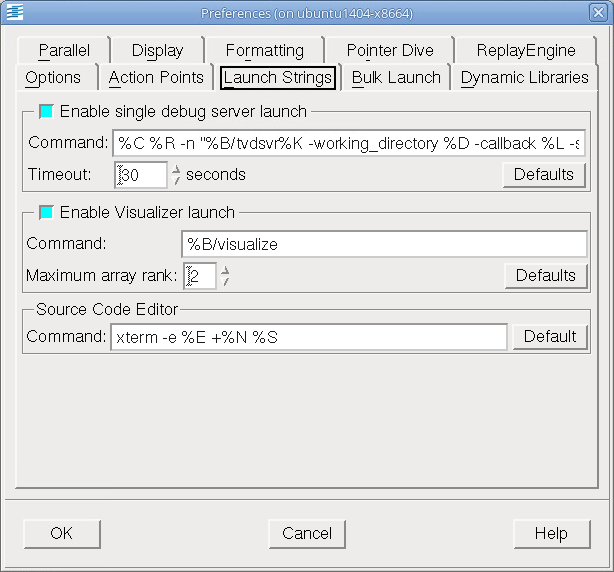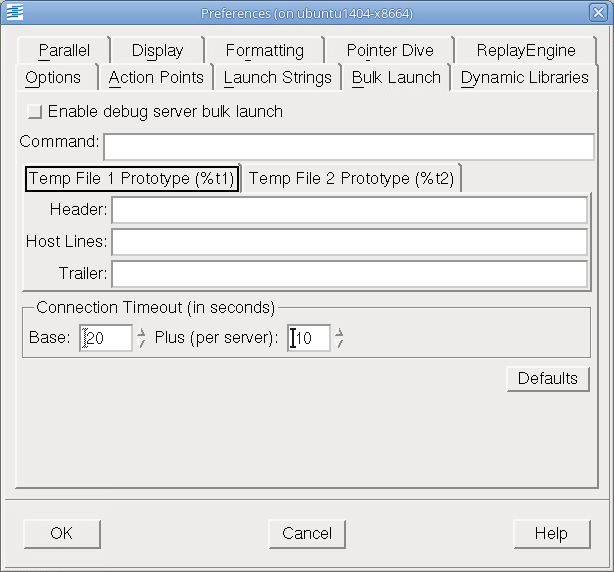Server Launch Options
Setting Single-Process Server Launch Options
Use the Enable single debug server launch check box in the Launch Strings Page of the File > Preferences dialog box to disable autolaunching, change the command that TotalView uses to launch remote servers, and alter the amount of time TotalView waits when establishing connections to a tvdsvr process. (The Enable Visualizer launch and Source Code Editor areas are not used when setting launch options.)
 |
Enable single debug server launch
Independently launches the tvdsvr on each remote system.
CLI: dset TV::server_launch_enabled |
NOTE >> Even if you have enabled bulk server launch, you probably also want to enable this option. TotalView uses this launch string after you start TotalView and when you name a host in the File > Debug New Program dialog box or have used the -remote command-line option. Disable single server launch only when it can’t work.
Command
The command to use when independently launching tvdsvr. For information on this command and its options, see TotalView Server Launch Options and Commands.
CLI: dset TV::server_launch_string |
Timeout
The time TotalView waits for a connection after automatically launching the tvdsvr process. The default is 30 seconds. If the connection isn’t made in this time, TotalView times out. Change the length of time by entering a value from 1 to 3600 seconds (1 hour).
CLI: dset TV::server_launch_timeout |
If you notice that TotalView fails to launch tvdsvr (as shown in the xterm window from which you started TotalView) before the timeout expires, click Yes in the Question dialog box that appears.
Defaults
Reverts to the default settings.
Clicking the Defaults button also discards all changes you made using a CLI variable. TotalView doesn’t immediately change settings after you click the Defaults button; instead, it waits until you click the OK button.
Setting Bulk Launch Window Options
Use the File > Preferences Bulk Launch Page to change the bulk launch command, disable bulk launch, and alter connection timeouts that TotalView uses when it launches tvdsvr programs.
CLI: dset TV::bulk_launch_enabled |
 |
Enable debug server bulk launch
Uses the bulk launch procedure when launching the tvdsvr. By default, bulk launch is disabled; that is, TotalView uses its single-server launch procedure.
Command
Command used to launch tvdsvr if bulk launch is enabled. For information on this command and its options, see Setting the Bulk Server Launch Command and IBM RS/6000 AIX.
CLI: dset TV::bulk_launch_string |
Temp File 1 Prototype
Temp File 2 Prototype
Temp File 2 Prototype
Specifies the contents of temporary files that the bulk launch operation uses. For information on these fields, see “TotalView Debugger Server (tvdsvr) Command Syntax” in the TotalView for HPC Reference Guide.
CLI: dset TV::bulk_launch_tmpfile1_header_line dset TV::bulk_launch_tmpfile1_host_lines dset TV::bulk_launch_tmpfile1_trailer_line dset TV::bulk_launch_tmpfile2_header_line dset TV::bulk_launch_tmpfile2_host_lines dset TV::bulk_launch_tmpfile2_trailer_line |
Connection Timeout (in seconds)
Sets the connection timeout TotalView uses after launching tvdsvr processes. The default is 20 seconds for responses from the process (the Base time) plus 10 seconds for each server process being launched.
A Base timeout value can range from 1 to 3600 seconds (1 hour). The incremental Plus value is from 1 to 360 seconds (6 minutes). See the online Help for information on setting these values.
CLI: dset TV::bulk_launch_base_timeout dset TV::bulk_launch_incr_timeout |
If you notice that TotalView fails to launch tvdsvr (as shown in the xterm window from which you started TotalView) before the timeout expires, select Yes in the Question dialog box that appears.
Defaults
Returns to the default settings.
Clicking Defaults also discards any changes made using a CLI variable. TotalView doesn’t immediately change settings after you click the Defaults button; instead, it waits until you click the OK button.





